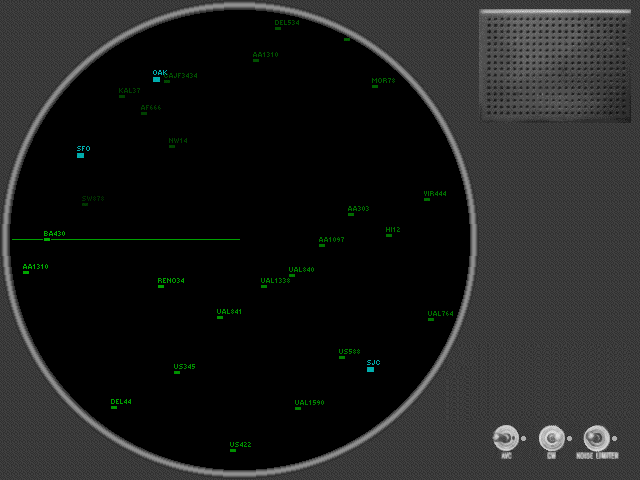 Here is a screenshot of the old, popular Air Traffic Control screensaver. Way back when in the mid-1990's I installed it on a publicly-viewable computer monitor at a security guard station in San Diego. In this particular building the security desk was positioned in such a way that all the dry-erase boards, paperwork, closed-circuit security camera monitors and computers could be seen and eavesdropped on by the general public from a large window.
Here is a screenshot of the old, popular Air Traffic Control screensaver. Way back when in the mid-1990's I installed it on a publicly-viewable computer monitor at a security guard station in San Diego. In this particular building the security desk was positioned in such a way that all the dry-erase boards, paperwork, closed-circuit security camera monitors and computers could be seen and eavesdropped on by the general public from a large window.
As the then Director of Security for a major high-rise, that lack of common sense in security procedure made me crazy (1). Let's face it, to use a sports analogy for the first and last time in my life, you don't hand the other team a copy of your playbook before the big game! In the military, they call that 'EEFI', which stands for Essential Elements of Friendly Information. In every war the Armed Services usually learns a few hard lessons about EEFI. During the Vietnam conflict it was a common practice to post the duty rosters in public, to be viewed by anyone, including the enemy. The unfriendlies used the info to determine troop positions and strengths for any given day. One Cold War anecdote about communist Russia comes to mind, in that an allied government became aware that a substantial increase in mitten purchases could have meant a winter build-up of armed forces on some friendly borders, so the other side responded in a way to block the build-up. It's also why military communications, both personal and otherwise are subject to monitoring and censorship. A large requisition of tire patch kits moving to Wisconsin may not mean much to the average person but there are entire agencies devoted to putting all the little bits of info together and using it all to gain an advantage over the other guys.
At the building where I worked I was concerned by the numbers of passers-by, homeless and thieves casing the area by watching what security was doing on our monitors. From outside the building standing on public property the ring-leader could watch through a window and see where our elevators were, where the guards were heading, how we were responding and etc. FYI, the leaders were usually over 18 and therefore legal adults and the other members of the raiding parties were usually juveniles, dealing with whom changed the playing field somewhat, as they were well aware. They were all pretty bold, standing outside on the sidewalk and using cell phones to communicate with their partners who were on the property evading security. It was maddening.
While altering methods in how we operated took care of most of the semi- and professional low-lifes, a few simple changes blocked the amateurs. Dry-erase boards were removed, a n obscuring screen-filter was put on the elevator control monitor among other changes. One of the most successful ways of defeating the bad guys was to have the person on the desk remain calm (2). When a young guard behaves with drama or panics, it clues others in that something is happening or fosters more panic.
On the PC at the security desk I installed the Air Traffic Control screensaver and tweaked the settings so it would activate after a minute of PC idle time, hiding any available info and serving as a ruse of technology that we did not possess.
The homeless guys were often a bit addled, either through chemicals or the stresses of living on the street, so they were easy to manipulate. When they nonchalantly sidled on up to the street-side window to look at the CCTV screens I'd point to them, then point to a glowing dot on the screensaver, then point to them again. They were led to believe that they were being tracked by sensors so we would know where they were and what they were up to. Soon, the homeless quit hanging around once they got the message. A simple deception but one that worked well enough (when combined with other changes) on the targeted demographic.
(1) Security often seems to be an afterthought in many buildings or as an annoyance and necessary evil. One place I worked allowed business cards to be used as personal identification or entry passes (a note on the back saying 'Please let so-and-so into my office tonight. Thanks, Bob'), allowing security guards to let people into locked offices after normal business hours. Of course, the criminal network (this info was usually spread by an employee wanting cash to some buddy of thiers) knows what businesses allow this and runners spend the day gathering cards, using them to gain entry at night and steal laptops and sandwiches from the community fridges.
(2) It would go something like this: A fire alarm would activate on the 31st floor and the guard would panic a bit. I'd ask, "Are you on fire?" The guard would pause and reply he wasn't, the alarm was 30 floors away from his position in the lobby. I'd then say, "You are 5 feet from the main lobby doors. When it gets hot you can just step outside. Until then use the Quick Response Checklist, help the Fire Department when they arrive to check the alarm and do the job."
Fear is the mind-killer.
How Well Can You Remember Colors?
2 hours ago



























Very interesting! I love hearing about the daily challenges of various careers.
ReplyDeleteThis comment has been removed by a blog administrator.
ReplyDeleteIf that post didn't make me paranoid already, the "comment deleted" totally did so.
ReplyDelete